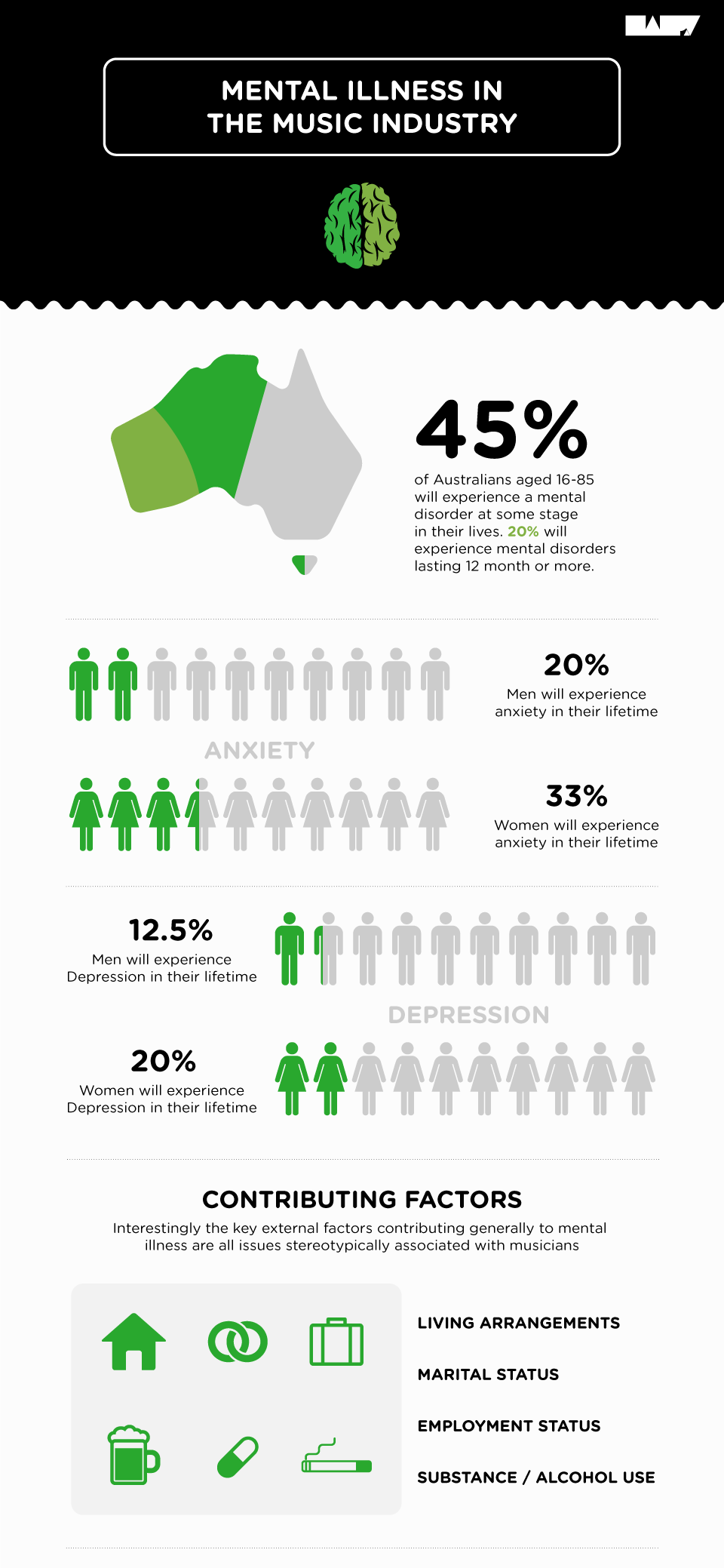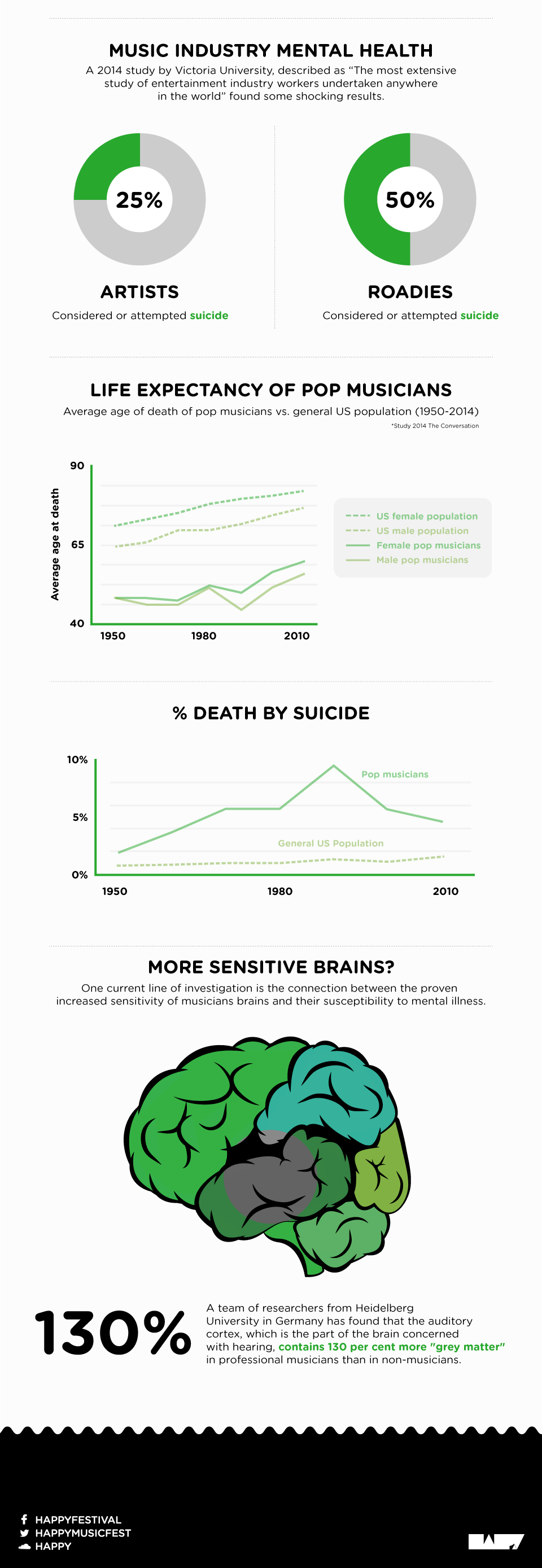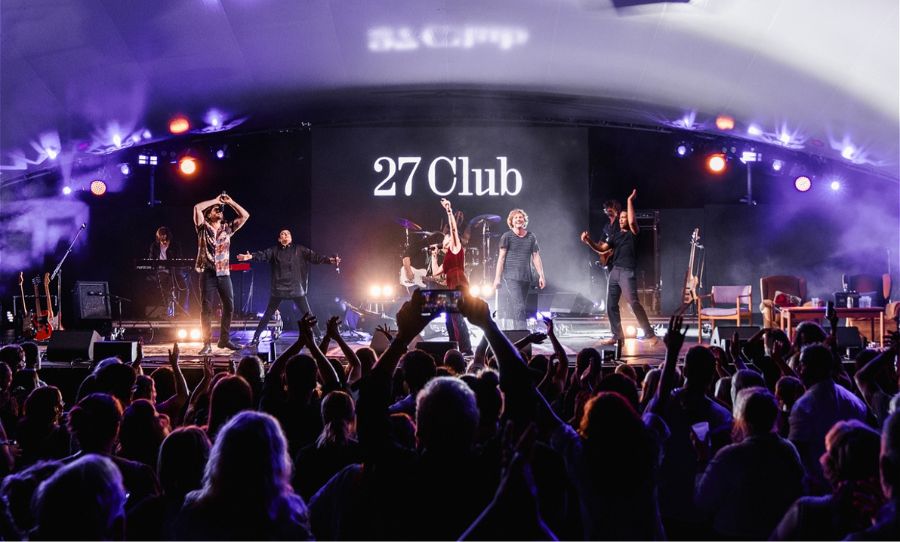As morbid as it might be, there’s no question that when it comes to celebrity figures’ Dionysian lifestyles, public meltdowns and untimely deaths intrigue us. Whether you are a music lover or aspiring musician, the romanticised myths of the music world are things which captivate our imagination and get us through the dreariness of our day to day. It is often thought that musicians, whether festival headliners or a bunch of twenty-somethings playing to a half-empty pub, are living an ideal lifestyle free from the mundane stresses of daily life. In most cases this is far from the truth.
Does the artist lifestyle help perpetuate mental illness in the music industry? It’s time to separate truth from myth and discuss the best way to get help.
The Bigger Picture
While mental illness in the music industry might seem to be its own peculiar case, it ties into an even broader issue. There’s little question that depression and anxiety are things which touch and concern all Australians in their everyday lives. Many may easily dismiss the idea of depression and anxiety with the notion that everyone feels sad, moody or low at times. However, depression and anxiety can develop into serious illnesses which impact upon both the physical and mental health of an individual and those around them.
While these conditions affect every person differently, some can suffer something less fleeting and more intense, spiralling into a period of poor mental health lasting weeks, months or years. The Australian Bureau of Statistics’ 2008 survey of national mental health provided the oft quoted statistic that one in three women and one in five men experience anxiety in their lifetimes, and that one in eight men and one in five women will have depression.

Mental illness in the music world
Since the publication of some concerning results from a ground breaking research undertaken by Victoria University in 2014, the issue of abnormally high rates of mental health issues and suicide within the Australian music industry have been an ongoing point of discussion by those inside of the business and out. Noted by The Age as being “The most extensive study of entertainment industry workers undertaken anywhere in the world” the investigation uncovered that performing artists lived shorter lives than the rest of the Australian community and that music industry workers are more likely to suffer from mental health issues or commit suicide than employees in any other sectors.
Equally disturbing was the fact that of those interviewed, 25% of Australian artists had attempted or considered suicide in the past and that many had not sought any form of help. These findings corroborate international studies showing that suicidal and accidental deaths are higher in musicians than the general population.
The ‘reality’ of the music world
As many Australian musicians and fans would attest, there are a number of musical communities, organisations and events that allow people to come together in a supportive environment to kick back, have fun and share their common love of music. Inversely, the music industry can be, at times, a smoke and mirrors business where artists serve as figureheads for a labyrinthine of business arrangements and support roles. Industry organisations, the media and even artists themselves perpetuate and encourage popular misconceptions to further financial gains.
In many cases this conceals the poor health and dire financial circumstances that are a reality for many within the industry. While many are in it for the love of it or could not imagine doing anything else, most artists have only a brief window of opportunity to ‘reach the top’ and secure some degree of long-lasting financial security. For those few lucky enough to be signed to a successful indie or major label, many will never see any financial return past an initial advance and many even end up in debt to their label or other creditors. While increasing numbers of independent artists are engaging fan bases directly and taking a ‘do it yourself’ approach to recording, few can break even without heavily cross-subsiding their work with income from other employment.
The 27 Club and other myths
There is a bit of a myth surrounding musicians dying young. While the popular conception is that many talented youths die at age of 27, the truth is that the most commonly recurring age of a death for musicians is actually 57 (still alarmingly young if you ask any baby boomer). The untimely deaths of iconic artists such as Kurt Cobain, Brian Jones, Jimi Hendrix, Janis Joplin, Jim Morrison and Amy Winehouse have propelled the notion of a ’27 Club’ into our collective pop-psyche and the idea has become embedded in the ideological values of many popular musicians. While lacking in factual merit,the myth pervades the consciousness of the artist, industry, media and public alike.
Although the verdict is still out, there is a common perception that peak periods of artistic creativity coincide with periods of personal lows. This is interlinked with another belief that people with depressive illnesses are drawn to the bohemian lifestyle and working in the arts. When viewed through the lens of popular culture, artists are seen as emotionally charged and eccentric outsiders who suffer for their art. The stereotypical artist is characterised by contradictorily possessing a larger than life confidence and a cripplingly insecure personality. In the mind of the public depression and anxiety might seem like things which come naturally; a forgone conclusion.
When it comes to factors which actually contribute to abnormally high instances of mental illness the truth may lay in the more immediate and mundane realities of the artistic lifestyle. Low finances, poor living conditions, an ever more crowded and competitive industry, the demands of multiple jobs, long periods of unemployment, pressure from record companies or management, unconventional working conditions, late nights, personal isolation, poor physical health, and widespread availability of excessive amounts of drugs and alcohol are the more likely causes of the phenomena.
To compound the issue further the music industry, the media and even friends or family valorise artists’ impulsive behaviour and excesses, creating an environment which exacerbates, rather than curbs, the problematic behaviour from which mental health issues freely flow.

Beyondblue
Depression and anxiety are unlikely to subside on their own. Given that depression and anxiety can reduce people’s motivation or confidence, it can be difficult to take the first step and reach out to friends, families or a professional. While there is no one proven way that people recover from anxiety or depression, and it differs in each case, it’s not all doom, gloom and bad news. Fortunately for those seeking support both conditions share many of the same treatments and with the right treatment most recover.
To assists those suffering from depression and anxiety as well as remove the stigma associated with talking about these issues openly there are a number of not-for-profit organisations which help individuals identify, treat and cope with depression. Beyondblue is once such organisation taking on the herculean task of working to reduce the negative impact of depression and anxiety in the Australian community.
An artist’s view
Many musicians within the community are putting together events to help raise awareness and raise much needed funds for issues relating to mental illness. One such is example is The Big Blue Bedroom, an acoustic gig conceived by Ben Stewart from Melbourne alt rock duo Slowly Slowly. Held in support of Beyondblue, the event offers an opportunity for people to have a fun night in the name of a serious issue, spread awareness of the issues Beyondblue supports and offer a safe environment for members of the community to come forward to chat to others about how they feel.
When asked what initially inspired him to put on the show Ben stated: “I’ve seen very close friends fall through cracks and I just wanted to put together a show to reiterate that depression and anxiety are illnesses everyone should feel okay talking about.” Shedding some light on his experience as a musician, he reveals that there are both ups and downs. “Playing in a band can be a really shitty slog at times, but for the 40 minutes you’re playing on stage you are the happiest person in the room.” He then adds, “I guess it’s those really focussed peaks and long troughs that can make the lifestyle unsustainable”
Georgia Maq from Melbourne’s Camp Cope, another participant in the Big Blue Bedroom, talks openly about her struggle with depression. Describing herself as having been on and off medication she has also been seeking help from a mental health profession for 10 years. Stressing the importance of gigs such as the Big Blue Bedroom, she adds, “I always like getting involved in events like this to try to share my own experiences in hopes that other people can relate and to raise awareness about how serious the consequences of mental illness can be if it isn’t talked about or treated as a serious condition.”
When asked for their view on whether depression and anxiety are a taboo in the music world, Ben contends that this has not been his experience. Regarding the Melbourne music scene he comments, “I think it’s a beautiful community. I’ve always felt a disposition towards listening to sad songs so I feel I have gravitated towards and built a friendship group that is really open about depression and anxiety.” This said he does note that there still much work to be done.
Reflecting on his own experiences Ben acknowledges the difficulties addressing the issue adding, “Reaching out can be the hardest step on the way to finding support. No one can do that for you except yourself so I just want to reiterate that if you’re thinking of saying something to a mate about feeling really down then please do it- people will always surprise you with their levels of kindness.”
Georgia’s view is similar. She considers that the issue is becoming less of a taboo, but cautions that there is still an ongoing need to raise funds for organisations like Headspace, Beyondblue and Lifeline.
The issue of mental illness and the music industry is equally alarming and confronting. A positive outcome of the increasing prominence of this issue within the public eye is that many within and without the music scene are coming together to take on the issue of mental illness by supporting the organisations tackling the issue and encouraging those in need to seek help. While the problem is far from resolution it is heartening to think that positive steps are being made.



